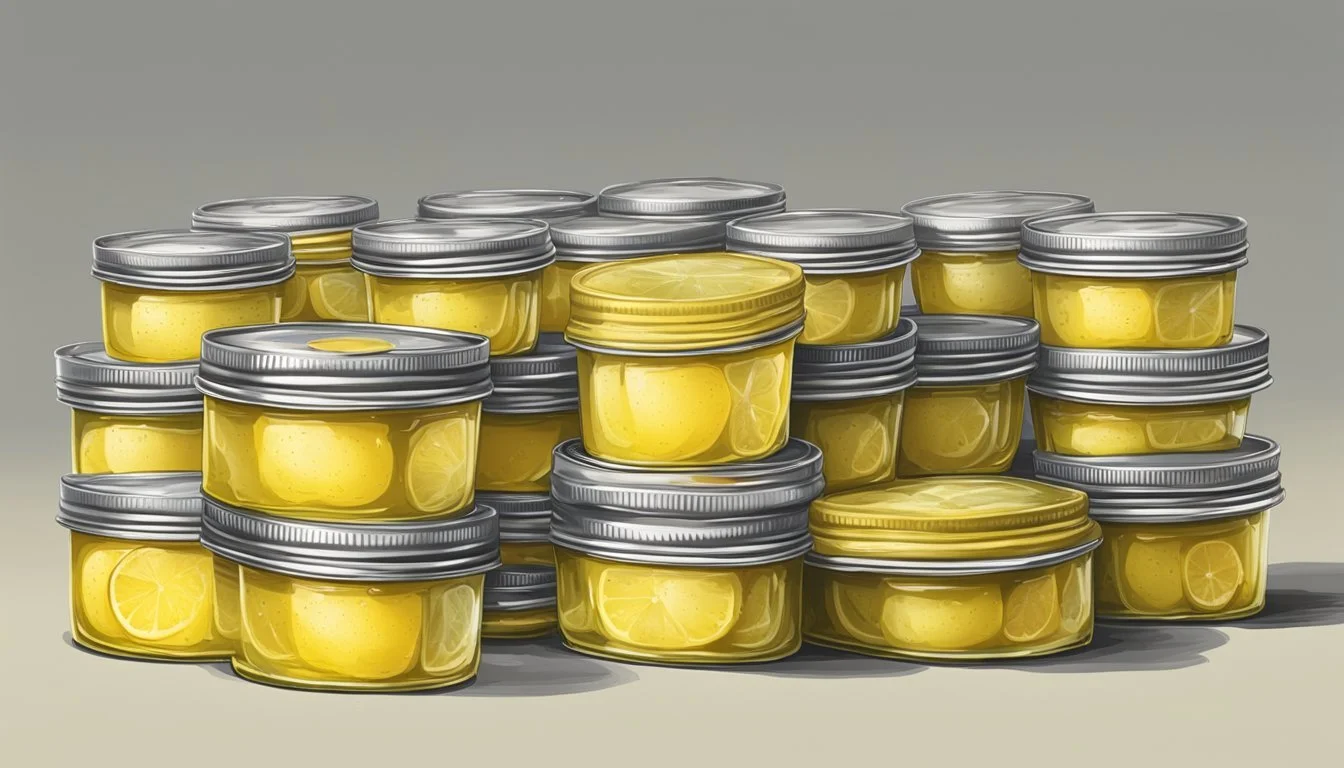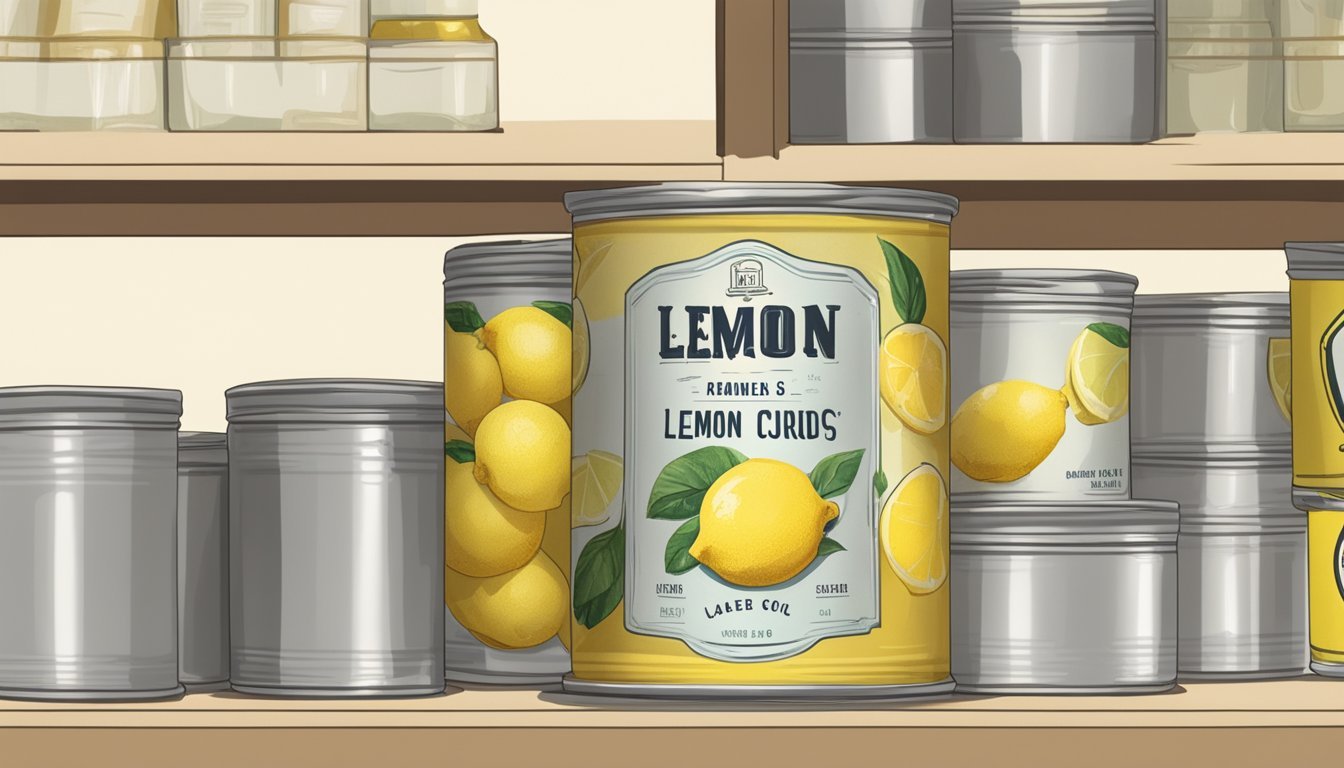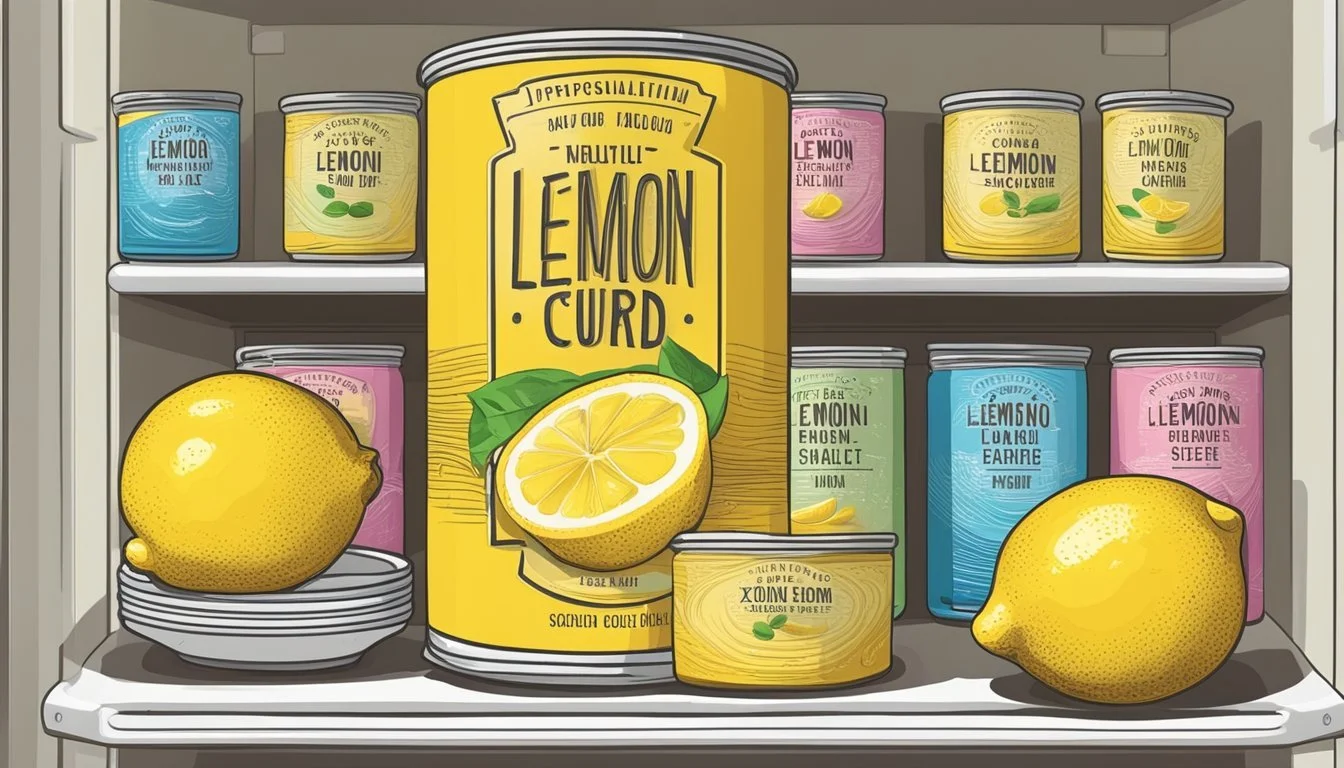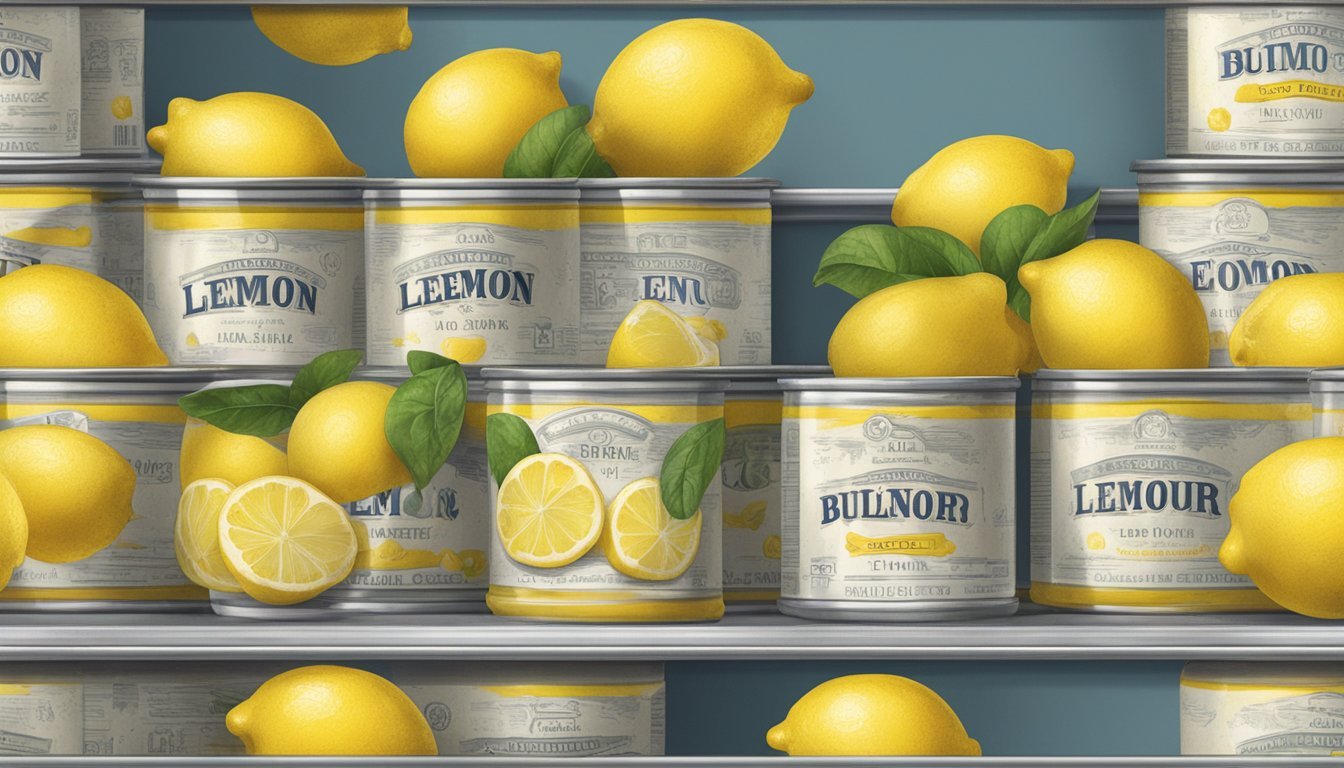Does Canned Lemon Curd Expire?
Essential Facts to Know
Does canned lemon curd expire? Yes, canned lemon curd does expire, like all perishable food products. For store-bought, unopened lemon curd, the shelf life can extend well past a year when stored properly. Once opened, the lifespan reduces to about 7-10 days in the fridge, unless stated otherwise on the packaging.
Homemade lemon curd is more perishable and typically lasts around a week with proper refrigeration. To extend its shelf life, freezing is an option, where it can last up to 3 months if stored in an airtight container or freezer bag.
Understanding the proper storage of lemon curd is crucial for maintaining its quality and safety. This guide delves into the best practices for both homemade and store-bought lemon curd, ensuring you enjoy this delicious spread without any concerns about spoilage.
Understanding Lemon Curd
Lemon curd is a tangy and sweet spread made from a blend of lemon juice, lemon zest, sugar, eggs, and butter. Homemade and store-bought varieties differ in ingredients and shelf life, offering consumers various options based on their needs and preferences.
Key Ingredients and Their Roles
Lemon Juice: Provides the tart flavor characteristic of lemon curd. It also acts as an acidic component that helps thicken the curd when combined with eggs.
Lemon Zest: Adds an intense lemon aroma and enhances the tartness. It contains natural oils that contribute to the overall flavor profile.
Sugar: Balances the tartness of the lemons, creating a sweet and tangy combination. It also helps in achieving the desired texture.
Eggs: Serve as a thickening agent. When heated, the proteins in eggs coagulate, giving lemon curd its creamy consistency.
Butter: Adds richness and smoothness to the texture. It also helps in setting the curd as it cools.
Comparison: Homemade vs. Store-Bought Varieties
Homemade Lemon Curd: Made using fresh ingredients without preservatives. This often results in a more vibrant flavor and better texture. However, homemade versions typically have a shorter shelf life, lasting about 1-2 weeks in the fridge and up to 3 months if frozen.
Canned Lemon Curd: Store-bought versions usually contain preservatives to extend shelf life. Unopened, they can last 2-3 weeks in the fridge; once opened, they last about 1-2 weeks. While convenient, they may lack the fresh, intense flavor of homemade curd and sometimes include additional stabilizers or thickening agents.
By understanding the roles of each ingredient and the differences between homemade and store-bought lemon curd, consumers can make informed choices based on their preferences for flavor, texture, and convenience.
Shelf Life of Lemon Curd
The shelf life of lemon curd depends on several factors, such as whether it is homemade or store-bought, and whether the container is opened or unopened. The quality of lemon curd can be preserved longer with proper storage techniques.
Factors Affecting Lemon Curd Shelf Life
Unopened Lemon Curd
Unopened, store-bought lemon curd generally lasts between 1-2 years when stored in a cool, dry place away from direct sunlight. Manufacturers provide a "best by" date for optimal quality, though the actual shelf life can sometimes extend beyond this date if storage conditions are ideal.
Opened Lemon Curd
Once opened, lemon curd should be refrigerated to maintain its quality and safety. Opened lemon curd typically lasts 2-3 weeks in the refrigerator. It's crucial to use clean utensils to avoid contamination, which can shorten its lifespan.
Homemade Lemon Curd
Homemade lemon curd has a shorter shelf life compared to commercial variants. In the refrigerator, it usually lasts about one week. For longer preservation, it can be canned using the boiling-water canning method, extending its shelf life to 3-4 months.
Assessing Expiration Dates
Manufacturer's Date
Manufacturers print expiration or "best by" dates on lemon curd packages. These dates are guidelines for peak quality, but proper storage conditions can occasionally extend the product's usability beyond these dates. Always check the packaging and consider the storage environment.
Visual and Olfactory Cues
Before using lemon curd past the expiration date, observe any changes in color, texture, or smell. Spoiled lemon curd often shows signs of molding or an off odor. Discard immediately if such signs are present.
Consistency and Taste
Expired lemon curd may lose its consistency and flavor. A watery texture or altered taste indicates that the quality has degraded. While it might still be safe, the culinary experience will be compromised.
Proper Storage Methods
To ensure the longest shelf life for canned lemon curd, it is crucial to store it correctly. Below are key methods to keep your lemon curd fresh and safe to consume.
Refrigerating Lemon Curd
Once a jar of lemon curd is opened, it should be refrigerated immediately. This slows down the degradation process and keeps the curd safe to eat. An airtight container, such as a glass jar with a secure lid, prevents air exposure which can spoil the curd.
Steps for Refrigeration:
Transfer lemon curd into a clean, airtight container.
Ensure the lid is tight and secure.
Store in the fridge, away from direct sunlight.
Typically, refrigerated lemon curd lasts 7 to 10 days. Check for signs of spoilage such as mold or an off smell before each use.
Freezing Lemon Curd for Extended Freshness
To extend the shelf life beyond refrigeration, freezing lemon curd is an effective option. Properly frozen lemon curd can remain fresh for up to one year. This method requires a freezer-safe container.
Steps for Freezing:
Allow the lemon curd to cool completely.
Transfer to a freezer-safe container or bag.
Remove as much air as possible before sealing.
Label the container with the date to track its storage time. When ready to use, thaw the lemon curd in the refrigerator, preferably overnight, to maintain its texture and flavor.
Proper storage practices are essential for preserving the quality and safety of canned lemon curd.
Identifying Signs of Deterioration
To ensure the safety and quality of your lemon curd, it's crucial to recognize the signs of spoilage. This includes changes in its appearance, smell, texture, and taste.
Visual and Olfactory Indicators
Lemon curd can show clear visual signs of deterioration. Mold can develop if the product is spoiled. Look for any unusual spots or fuzzy growths on the surface. Color changes are also critical; a spoiled lemon curd may shift from a vibrant yellow to a dull or brownish hue.
The smell can be a significant indicator of spoilage. Fresh lemon curd has a bright, tangy aroma. If the scent turns sour, musty, or off-putting, it indicates bacterial growth and spoilage.
Texture and Taste Changes
The texture of lemon curd should be smooth and creamy. If it becomes watery, has lumps, or separates, this is a clear sign of spoilage. Consistency changes can suggest bacterial activity and should not be ignored.
The taste is another key aspect. Lemon curd should have a tangy, sweet flavor. If you notice a metallic taste, unusual bitterness, or it just tastes off, it's spoiled. Eating expired lemon curd can be harmful, so discard any that have these issues.
Using Lemon Curd in Recipes
Lemon curd can enhance a variety of dishes, from desserts to breakfast items, thanks to its tangy, sweet flavor and creamy texture. Key uses include being a spread, topping, or filling.
Culinary Applications for Fresh Lemon Curd
Spread
Fresh lemon curd works wonderfully as a spread on scones, toast, and cookies. Its vibrant flavor pairs well with these bakery items, bringing a delightful zesty note.
Topping
Lemon curd also shines as a topping. It can be drizzled over ice cream, yogurt, or incorporated into whipped cream for added flavor. This usage highlights its versatility in both chilled and warm dishes.
Filling
As a filling, lemon curd can be used in cakes, pie, and pastries. Its thick consistency makes it perfect for adding a burst of flavor in delicate pastries and layered cakes. This function broadens its culinary utility from simple sweets to more elaborate desserts.
Food Safety and Lemon Curd
Ensuring the safety of lemon curd requires understanding proper storage methods, shelf life, and potential risks.
Guidelines for Safe Consumption
Lemon curd has a limited shelf life. Store-bought canned lemon curd typically lasts 2-3 weeks in the refrigerator when unopened and 1-2 weeks once opened. It's crucial to refrigerate lemon curd immediately after opening to inhibit bacterial growth.
Homemade lemon curd tends to last shorter than commercially prepared versions. It is recommended to consume it within 1-2 weeks when stored in the refrigerator. The National Center for Home Food Preservation suggests freezing lemon curd for longer storage, up to 3 months. Always use freezer-safe containers and ensure all air is removed to prevent contamination.
Preventing Contamination and Bacterial Growth
Proper storage is vital for food safety when dealing with lemon curd. Refrigeration is essential to slow down the growth of harmful bacteria and mold. Always keep lemon curd tightly sealed in clean, airtight containers.
When preparing homemade lemon curd, maintain a hygienic environment to avoid introducing contaminants. Pre-measuring ingredients and using freshly cleaned equipment reduce the risk of bacterial introduction.
For store-bought curd, check for any signs of spoilage such as off-odor, discoloration, or mold. Discard any curd that appears to have these issues. Adhering to expiration dates and proper storage techniques will help ensure the safety of your lemon curd.
Canning and Preserving Lemon Curd
Canning lemon curd allows for extended shelf-life when done correctly. Key techniques focus on safety and effectiveness, while understanding shelf-life helps maintain its quality over time.
Home Canning Techniques
Home canning of lemon curd typically uses water bath canning. This method involves preparing the lemon curd with ingredients like sugar, lemon juice, zest, eggs, and butter. It is critical to maintain acidity levels by using commercially bottled lemon juice to ensure safety.
The process includes:
Sterilizing half-pint jars and lids.
Filling jars with curd, leaving 1/2 inch headspace.
Sealing jars and placing them in a water bath canner.
Bringing the water to a boil and maintaining it for around 15 minutes before turning off the heat.
These steps ensure the lemon curd is properly sealed and safe for longer storage.
Shelf-Life of Home-Canned Lemon Curd
Properly canned lemon curd, when stored in a cool, dark place, can last up to one year. The key to longevity is ensuring a properly sealed jar to prevent contamination. The high acidity of lemon curd acts as a natural preservative, making it less susceptible to spoilage.
Signs of spoilage include off smells, discoloration, and mold. It is essential to check and discard any jars that show deterioration.
Homemade lemon curd, despite being canned, may have a slightly shorter shelf-life than other pickled or canned goods due to its composition. Regularly monitoring and storing in ideal conditions can maintain its quality closer to the one-year mark.
Alternatives to Traditional Lemon Curd
There are several alternatives to traditional lemon curd that offer similar tangy and sweet flavors, with slight variations in texture and ingredients. These substitutes cater to different preferences and can be used based on what is available in your kitchen or dietary needs.
Substitutes and Variations
Lemon Creme/Cream
Lemon creme has a smoother, creamier texture compared to lemon curd. It retains the tangy flavor typical to lemon-based spreads. Made with fresh lemon juice and zest, it delivers a familiar taste profile while offering a different consistency. It's ideal for those who prefer a silkier spread.
Lime Curd
Lime curd serves as another citrus-based alternative with a sharper acidic profile. Like lemon curd, it requires fresh lime juice, zest, egg yolks, and butter, giving it a tart and vibrant flavor. This option adds a unique twist to your desserts and baked goods.
Lemon Pie Filling
Lemon pie filling is a thicker substitute, suitable for pies and tarts. It is made with lemon juice, zest, and cornstarch to achieve its firm consistency. This alternative is excellent for recipes that benefit from a denser texture.
Orange Curd
Orange curd provides a sweeter, less tangy alternative. It combines fresh orange juice, zest, egg yolks, and butter. This curd offers a gentle flavor, perfect for those who find lemon curd too intense. It brightens up dishes while maintaining a smooth texture.
Lemon Custard
Lemon custard is a simple substitute with similar ingredients to lemon curd but with a richer, creamier finish. Made with lemon zest, juice, egg yolks, and cream, it is perfect for pastry fillings and dessert toppings. Its thicker consistency is a hit among custard lovers.









